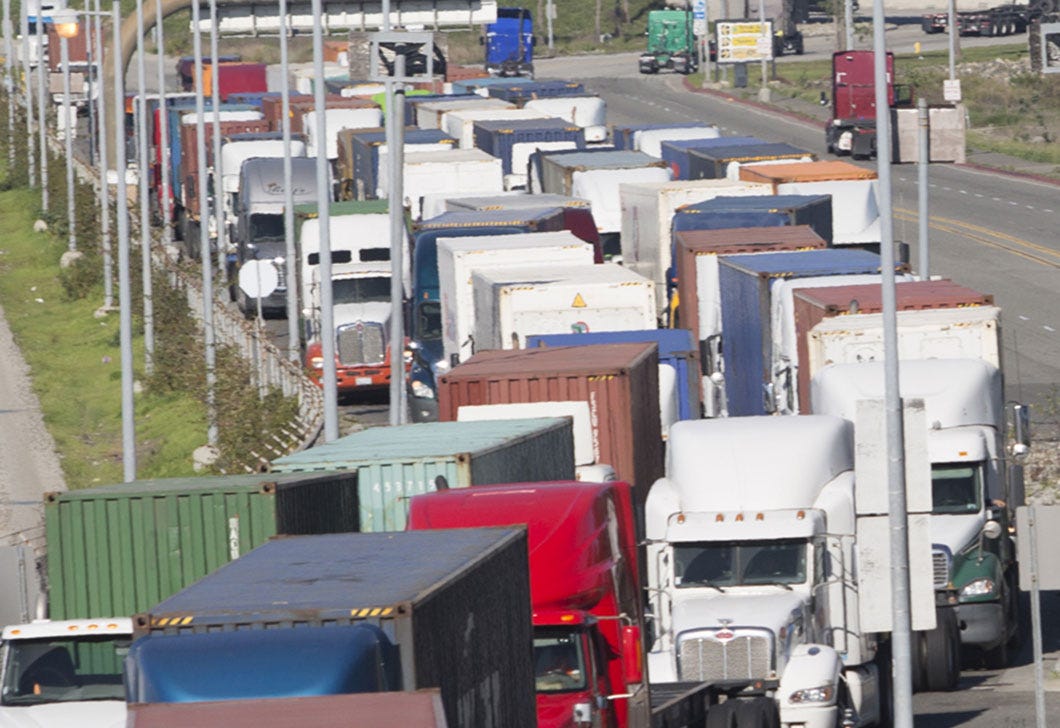Forced into debt.
Left with nothing.
دست آخر آس و پاس- بدون هیچ چیز- ماندن
nto-ds://www.usatoday.com/pages/interactives/ne
Los Angeles — Samuel Talavera Jr. did everything his bosses asked.
Most days, the trucker would drive more than 16 hours straight hauling LG dishwashers and Kumho tires to warehouses around Los Angeles, on their way to retail stores nationwide.
He rarely went home to his family. At night, he crawled into the back of his cab and slept in the company parking lot.
For all of that, he took home as little as 67 cents a week.
Then, in October 2013, the truck he leased from his employer, QTS, broke down.
When Talavera could not afford repairs, the company fired him and seized the truck -- along with $78,000 he had paid towards owning it.
Talavera was a modern-day indentured servant. And there are hundreds, likely thousands more, still on the road, hauling containers for trucking companies that move goods for America’s most beloved retailers, from Costco to Target to Home Depot.
These port truckers -- many of them poor immigrants who speak little English -- are responsible for moving almost half of the nation’s container imports out of Los Angeles’ ports. They don't deliver goods to stores. Instead they drive them short distances to warehouses and rail yards, one small step on their journey to a store near you.
A yearlong investigation by the USA TODAY Network found that port trucking companies in southern California have spent the past decade forcing drivers to finance their own trucks by taking on debt they could not afford. Companies then used that debt as leverage to extract forced labor and trap drivers in jobs that left them destitute.
If a driver quit, the company seized his truck and kept everything he had paid towards owning it.
If drivers missed payments, or if they got sick or became too exhausted to go on, their companies fired them and kept everything. Then they turned around and leased the trucks to someone else.
Drivers who manage to hang on to their jobs sometimes end up owing money to their employers – essentially working for free. Reporters identified seven different companies that have told their employees they owe money at week’s end.
The USA TODAY Network pieced together accounts from more than 300 drivers, listened to hundreds of hours of sworn labor dispute testimony and reviewed contracts that have never been seen by the public.
Using the contracts, submitted as evidence in labor complaints, and shipping manifests, reporters matched the trucking companies with the most labor violations to dozens of retail brands, including Target, Hewlett-Packard, Home Depot, Hasbro, J.Crew, UPS, Goodyear, Costco, Ralph Lauren and more.
Among the findings:
- Trucking companies force drivers to work against their will – up to 20 hours a day – by threatening to take their trucks and keep the money they paid toward buying them. Bosses create a culture of fear by firing drivers, suspending them without pay or reassigning them the lowest-paying routes.
- To keep drivers working, managers at a few companies have physically barred them from going home. More than once, Marvin Figueroa returned from a full day’s work to find the gate to the parking lot locked and a manager ordering drivers back to work. “That was how they forced me to continue working,” he testified in a 2015 labor case. Truckers at two other companies have made similar claims.
- Employers charge not just for truck leases but for a host of other expenses, including hundreds of dollars a month for insurance and diesel fuel. Some charge truckers a parking fee to use the company lot. One company, Fargo Trucking, charged $2 per week for the office toilet paper and other supplies.
- Drivers at many companies say they had no choice but to break federal safety laws that limit truckers to 11 hours on the road each day. Drivers at Pacific 9 Transportation testified that their managers dispatched truckers up to 20 hours a day, then wouldn’t pay them until drivers falsified inspection reports that track hours. Hundreds of California port truckers have gotten into accidents, leading to more than 20 fatalities from 2013 to 2015, according to the USA TODAY Network's analysis of federal crash and port trade data.
- Many drivers thought they were paying into their truck like a mortgage. Instead, when they lost their job, they discovered they also lost their truck, along with everything they’d paid toward it. Eddy Gonzalez took seven days off to care for his dying mother and then bury her. When he came back, his company fired him and kept the truck. For two years, Ho Lee was charged more than $1,600 a month for a truck lease. When he got ill and missed a week of work, he lost the truck and everything he’d paid.
- Retailers could refuse to allow companies with labor violations to truck their goods. Instead they’ve let shipping and logistics contractors hire the lowest bidder, while lobbying on behalf of trucking companies in Sacramento and Washington D.C. Walmart, Target and dozens of other Fortune 500 companies have paid lobbyists up to $12.6 million to fight bills that would have held companies liable or given drivers a minimum wage and other protections that most U.S. workers already enjoy.
This isn’t a case of a few bad trucking companies accused of mistreating a handful of workers.
Since 2010, at least 1,150 port truck drivers have filed claims in civil court or with the California Department of Industrial Relations’ enforcement arm, known as the labor commission.
Judges have sided with drivers in more than 97% of the cases heard, ruling time after time that port truckers in California can’t legally be classified as independent contractors. Instead, they are employees who, by law, must be paid minimum wage and can’t be charged for the equipment they use at work.
The rulings stop there. They do not address specific allegations of abuse by drivers, including whether trucking companies physically barred them from leaving work or ordered them to work past federal fatigue limits.
But allegations like those have been made in sworn testimony in hundreds of the cases, virtually all of which ended with trucking companies ordered to repay drivers for truck expenses and lost wages. The USA TODAY Network found that at least 140 trucking companies have been accused by at least one driver of shorting them of fair pay or using threats to squeeze them to work longer hours.
Prominent civil rights leader Julian Bond once called California port truckers the new black tenant farmers of the post-Civil War South. Sharecroppers from that era rented farmland to make their living and regularly fell into debt to their landlords. Widespread predatory practices made it nearly impossible for the farmers to climb out.
Through lease contracts, California’s port truckers face the same kinds of challenges in ways that experts say rarely happen in the U.S. today.
“I don’t know of anything even remotely like this,” said Stanford Law School Professor William Gould, former chairman of the National Labor Relations Board and one of the nation’s top labor experts.
‘‘
You’re working to get yourself out of the debt. You just don’t see anything like that.
’’
Reporters tried to contact owners and managers at more than 30 trucking companies. Many did not respond or declined to comment.
Those willing to answer questions said they have never used truck leases as a way to mistreat drivers. Several insisted that truckers’ allegations have been manufactured as part of a union organizing campaign by the Teamsters. The union has for years helped drivers file labor complaints and lawsuits.
“I’m not going to say that there were no violations out there,” said Weston LaBar, executive director of the Harbor Trucking Association. But, he added, they were “unintentional,” the result of market pressures that threatened to bankrupt trucking companies.
LaBar said he wasn't aware of companies still drawing up leases as more trucks get paid off. But drivers all over the industry are still locked in contracts they signed years ago.
Some company owners said their lease-to-own programs were a favor to truckers who might otherwise have been out of work. And there are drivers who make it through the contract to own their trucks, something that’s grown more common with time and a rebounding economy. Drivers who can't make a living aren't working hard enough, many company executives say.
“Our owner very generously went out and purchased a fleet of clean trucks,” said Marc Koenig, a vice president at Performance Team, which has lost cases to 21 drivers at the California labor commission. “That’s what really frustrated our owner. He really reached out and helped these guys.”
Koenig answered questions while traveling to Massachusetts to meet with TJX, the $49-billion parent company of retailers T.J. Maxx, Marshalls, and HomeGoods.
"We take these concerns very seriously at TJX," the company said in a statement, citing its vendor "code of conduct" that requires contractors on its supply chain to follow the law.
California’s port truckers make it possible for the Walmarts and Amazons of the world to function. Even so, most of the two dozen retail companies contacted by the USA TODAY Network declined to comment, some saying they had never heard of the rash of labor violations at their primary ports of entry.
Only Goodyear said it took immediate action. Spokesperson Keith Price said in a statement that the tire giant dropped Pacific 9 in 2015, “within two weeks” of California labor commission decisions in favor of dozens of drivers.
The few others that issued statements said it was not their responsibility to police the shipping industry. Retailers don't directly hire the truckers who move their goods at the pier. They generally hire large shipping or logistics firms that line up trucking companies through a maze of subcontractors.
‘‘
Target doesn’t have anything to share here.
’’
“We’re not trying to wash our hands of this issue,” said John Taylor, a spokesman for LG Electronics, “but it’s frankly far afield” and “really very disconnected from LG Electronics.”

JOSE JUAN RODRIGUEZ
A Critical Change
For decades, short-haul truckers at the nation’s ports relied on cheap clunkers to move goods to nearby warehouses and rail yards.
With little up-front investment, drivers – most of them independent contractors who owned their own trucks – could make a decent living squeezing the last miles from dilapidated big rigs that weren’t suited for the open road.
In October 2008, that changed dramatically in southern California, home of the nation’s busiest ports, Los Angeles and Long Beach. State officials, fed up with deadly diesel fumes from 16,000 outdated trucks, ordered the entire fleet replaced with new, cleaner rigs.
Suddenly, this obscure but critical collection of trucking companies faced a $2.5 billion crossroads unlike anything experienced at other U.S. ports.
Instead of digging into their own pockets to undo the environmental mess they helped create, the companies found a way to push the cost onto individual drivers, who are paid by the number and kinds of containers they move, not by the hour.
There are 800 companies regularly operating at the LA ports. Almost all of them turned to some form of a lease-to-own model, some without thinking through the consequences, said industry consultant and lobbyist Alex Cherin.

REYES CASTELLANOS
“Flying by the seat of their pants and making it up as they went along,” he said of the scramble to find trucks for drivers. “Ultimately what they were trying to do was survive in a business with very thin margins.”
Truckers at dozens of companies describe the same basic scene. They were handed a lease-to-own contract by their employer and given a choice: Sign immediately or be fired. Many drivers who spoke little English said managers gave them no time to seek legal advice or even an interpreter to read the contract.
It was "take it or leave it," according to Fidel Vasquez, a driver for Total Transportation who said he couldn’t read the contract because it was in English.
Jose Juan Rodriguez owned his own truck and drove primarily for Morgan Southern, where two dozen drivers have filed claims for back pay at the California labor commission and civil court. Like many drivers, Rodriguez said he didn’t understand what he was signing, but felt he had no choice.
His wife has stage three breast cancer and his adult son has severe brain damage requiring frequent doctor visits.
“Where do I sign?” Rodriguez recalled asking right away. “The only thing I had to worry about is work, because I have a family.”
One-sided contracts
The contracts work like sub-leases. Knowing drivers could not qualify for their own loans or leases, trucking companies arranged to finance their fleets. Then they had drivers sign up for individual trucks.
Drivers gave their old trucks – many of which they owned outright – to their company as a down payment. And just like that they were up to $100,000 in debt to their own employer. The same guys would have had a tough time qualifying for a Hyundai days earlier.
As far back as August 2008, a trucking finance firm warned Port of Long Beach board members that 40% of drivers were likely to default on truck leases. But no one stopped the deals, which place almost all of the financial risk onto the workers.
Drivers' names were not on the truck titles. And many contracts effectively barred drivers from using their truck to work for other companies.
The companies also retained the power to decide how much work to give their drivers. They decide who gets the easiest and most lucrative routes -- and who gets to work at all.
That leaves drivers in constant fear of upsetting managers, who can fire them for any reason, or simply stop sending them business, a process some call “starving” them out of the truck.
On a five-year lease, drivers could pay in for four years and 11 months. If they got sick, fell behind on the lease or were fired in the last month, they could lose everything – as if they had never paid a dime.
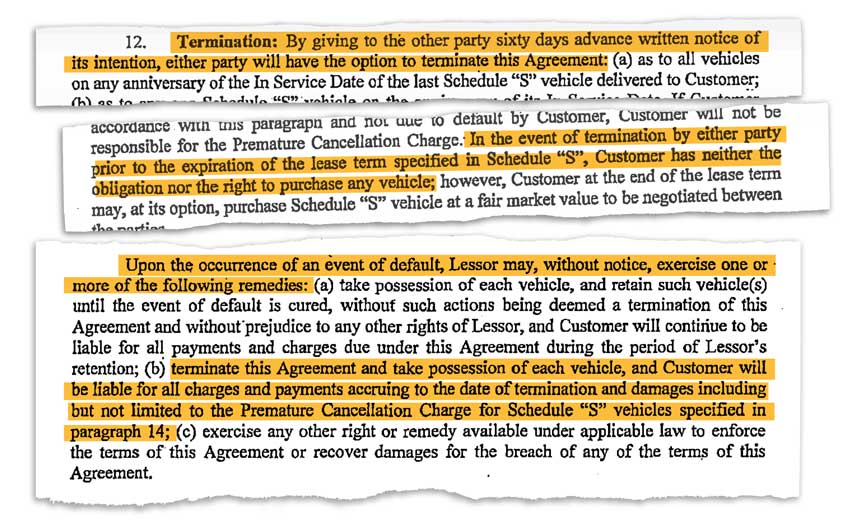
The USA TODAY Network reviewed more than a dozen lease-to-own contracts from companies, like this one from Pacific 9. They often give companies almost complete control over their drivers, who they labeled as independent contractors. More importantly, the contracts let the companies fire truckers at will, keeping both the truck and the payments that went into it. Contract
“The truck was never his,” one California labor commission hearing officer noted in a March, 2014 ruling. “And he has nothing to show for all the time and money he spent.”
It’s a lesson Leocadio Lopez learned the hard way.
A former house painter and father of two, Lopez lost all his money after pouring his savings into a truck at Total Transportation Services, where more than 80 drivers have said they were cheated out of fair pay or charged for equipment their employer should have covered.
Lopez had to borrow cash just to keep up with his bills. Christmas and birthdays came and went without gifts for his children. His family had to get groceries from food pantries.
After making payments for six years, about $700 a week for the lease and maintenance, he lost the truck and the tens of thousands of dollars he had scraped together to keep it.
‘‘
They do what they want and you can’t do anything.
’’
Lopez was one of dozens of drivers who filed claims against Total Transportation between 2013 and 2014. Most of the men were pulled into a conference room one week by company president Vic La Rosa and fired, according to 24 sworn complaints filed with the NLRB.
“There are no rules,” one driver recalled La Rosa saying when he took the trucks. “No law or politicians will help you.”
La Rosa denied committing labor violations and said the sworn statements made by his former drivers are false.
“That’s not the way it went down,” he told reporters, declining to elaborate.
Without admitting guilt, La Rosa settled the drivers’ cases with the NLRB, paying $200,000 in fines and agreeing to rehire some of them as employees.

Rene Flores, an immigrant from El Salvador, drives from the Port of Long Beach to Arizona, resting only a few hours each night. Flores rarely gets to see his two sons, Napoleon and Jose, because he’s always on the road.
Working for free
For years, Rene Flores regularly has driven 20 hours a day, six days a week, hauling pistachios and medical equipment into the desert from the Port of Long Beach.
“If I don’t work,” Flores says, “my kids will starve.”
He keeps a log book of fake hours in the glovebox and the real one hidden beneath his seat in case of a surprise inspection.
Flores rarely sees his two sons, because he spends his one day off trying to catch up on lost sleep.
“Of course they know,” he told reporters when asked if his managers realize how much he works. “But the company doesn’t care.”
Morgan Southern did not answer questions about drivers' claims. But spokesperson Robert Milane said in a statement, "We follow all DOT regulations and guidelines with respect to HOS (hours of service) and logs."
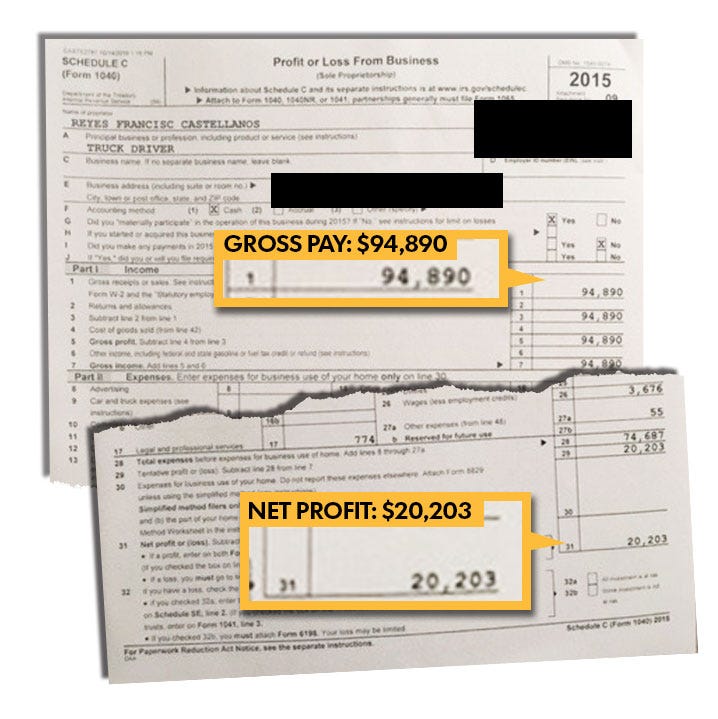
Like a driver's weekly check, their yearly take home pay plummets because of the truck costs. In 2015, Reyes Castellanos, who provides for his wife and mother-in-law, made about $20,000 after expenses.Reyes Castellanos' tax return
Drivers who signed up for leases watched their take-home pay plummet and often had no choice but to work longer hours.
After emigrating from Nicaragua in 1992, Samuel Talavera Jr. drove a truck at the Los Angeles harbor and made an honest living. Since 9/11, all truckers working at ports of entry must be legal residents.
Talavera bought his wife, Reyna, a house and took his daughters to Disneyland.
But everything changed in late 2010, when he went into the QTS warehouse and his boss told him he needed to trade in his truck and sign a lease-purchase contract.
For the next four years, he worked mind-numbing hours to pay the bills.
To save commuting time, he slept in his truck at work. To avoid bathroom breaks, he kept an empty two-liter bottle by his side. He became a ghost to his family.
Still, he had to drain his savings to survive.
A stack of weekly paychecks he keeps in a drawer at home shows his worst weeks. He grossed $1,970 on June 3, 2011, but it all went back to QTS. After the lease and other truck expenses, he took home $33.
On February 10, 2012, he took home $112 after expenses.
The next week, he made 67 cents.

Samuel Talavera’s disappearing paycheck
Deductions from his pay from QTS, INC., on Feb. 17, 2012
| Initial amount | $854.13 |
| Insurance | -$90 |
| Lease | -$250 |
| Tires | -$35 |
| Registration | -$65 |
| Gas | -$405.46 |
| Remaining amount | $0.67 |

Depending on how many containers they're able to move, drivers' pay can vary wildly. Some weeks they gross hundreds or even thousands, but take home a tiny fraction of that after the truck costs.Samuel Talavera's paycheck
Reyna got two office cleaning jobs and a third taking care of the elderly to try to make ends meet. Even so, when her father died, she couldn’t afford to fly home for the funeral.
Talavera was working so much, she said. “We didn’t understand why there was hardly any money left over.”
Through interviews and court records, reporters catalogued more than 120 drivers who say they regularly worked past exhaustion, 12 to 20 hours straight behind the wheel.
Federal law prohibits commercial truckers from driving more than 11 hours at a time, and they can’t work at all after 14 hours, until they have had 10 hours of rest. Government studies show that for every hour past 11 that someone drives, the chances of crashing increase exponentially.
Many drivers feel they have no choice but to take that risk.
ADVERTISEMENT
On bad weeks – when Flores hits traffic or gets assigned a low-paying delivery – he says he takes home $300 or less for 100 hours of work. That translates into $3 an hour, less than a third of what he could make washing dishes at California’s minimum wage.

ALFREDO ARAMBULA
Drivers could quit and find new work. But many, like Flores, say they’ve stayed on hoping things would improve. Then they realized if they quit, they would lose thousands paid toward their truck. “They’re captive,” Teamsters’ international vice president Fred Potter said.
Truck payments can cut so deep into wages that drivers actually owe their employer come Friday.
“Working for free,” one driver called it in a court statement.
Paychecks read instead like weekly invoices: Faustino Denova, negative $9.64. Germen Merino, negative $92.50. Jose Covarrubias, negative $280.
For some truckers, the debt stacked up week after week, until they borrowed against their house or from friends, used their savings to pay it off or until their company fired them.
‘‘
The company would take everything.
’’
Enough weeks like that put truckers into a hole they can’t escape.
Like many drivers, Talavera and his wife fell behind on their mortgage, and then stopped paying it altogether. They filed for bankruptcy to save their home.
James Kang, former president of the now-defunct QTS, declined to comment and then hung up on a reporter.

Eduardo Garcia, 57, was a truck driver for Tradelink Transport. He said he'd often come home after double shifts, only to find his boss in the parking lot, waving drivers back onto the road to keep working.
‘We are not human’
In ways that happen in virtually no other workplace in America, port trucking companies in Southern California wield enormous power over their workers.
Through interviews and a review of sworn statements, the USA TODAY Network identified more than 100 drivers who reported threats and retaliation. Managers punish drivers most often for turning down the lowest-paying routes, missing work or refusing to work past federal hour limits.
At least 24 companies have fired drivers outright under those circumstances, according to interviews and a review of court, NLRB and California labor commission records. In each case, the driver lost his truck and what he’d paid into it.
Arcadio Amaya said he refused to work 15 hours straight one night at Pacgran Inc. and was fired the next day. He lost $26,400 he had paid toward a truck.
Armando Logamo, a former driver at RPM Harbor Services, said he saw other drivers bribing dispatchers for better-paying assignments, so he told his supervisor. The next week, Logamo was fired. He lost the truck, along with all the payments he had put into it.
“They fired me because I was one of the ones that was speaking up,” he said. “It was pretty devastating because I was with them for two plus years.”
Eddy Gonzalez once missed a day when he was called to court to testify as a witness. As punishment, he said his boss at Seacon Logix didn't let him work the next day.
Then, a few months later, he missed a week to bury his dead mother. When Gonzalez came back, he said, his boss cleaned out his truck and fired him on the spot while he pleaded to keep his job.
“He just took the keys and left,” Gonzalez testified in court.

Eddy Gonzalez said he lost his job because he took time off for his mother's funeral. His former boss at Seacon Logix testified it was because he doubted Gonzalez could keep up with his truck payments.Trial transcript, Romero Garcia v. Seacon Logix
Representatives from all three companies denied their drivers’ accounts.
“It’s all f---ing bulls---,” said Edwin Merino, a former operations manager at Pacgran, which has since gone out of business. Merino said Amaya wasn’t fired. He said he quit because he had fallen so far behind on truck payments that he wasn’t making money when he worked.
Drivers say they are always one wrong step away from the street. Companies dangle that threat – “on pain of ‘discipline’ or termination,” as one judge put it in a labor case ruling – to force drivers to work around the clock.
Some companies have physically barred their workers from going home at night.
Eduardo Garcia, 57, remembers pulling into the Tradelink Transport truck yard exhausted after almost 15 hours behind the wheel one night in October 2010.
He was ready to go home to his family, but as he approached the Tradelink parking lot, he realized his day wasn’t over.
His said his boss was standing at the gate again, waving drivers back to the docks and refusing to let them into the spaces where they were required to park for the night.
“If you say no,” Garcia said, “then the next day, don't come in. No work for you.” So he went back to the docks.
Drivers at two other companies tell similar stories. They said it would happen regularly, especially if their employer was on the verge of missing a shipping deadline.
Jovanni Castillo said he worked every waking hour, six days a week, at Imperial CFS. If he was not driving 20 hours a day -- from 7 a.m. to 3 the next morning -- his company fined him $200, he said.
“We are not human,” Garcia told reporters inside his small, cluttered house tucked behind an alley in Los Angeles. “We are machines for making money for these people.”
Rigoberto Cea, president of Tradelink, said he’d go into the parking lot, but only to encourage drivers to keep working. “We would go out there and ask and beg,” he said in an interview. “Their interpretation was that they were slaves to us.”
An attorney for Imperial CFS denied the violations, saying the company has never punished its drivers. Imperial CFS, like many of the trucking companies, appealed labor commission rulings to civil court and later settled with drivers without admitting guilt.

MANUEL RIOS
At Pacific 9, 20 drivers testified at the California labor commission that they had to work up to 19 hours a day, violating federal fatigue laws for truckers.
They said dispatchers ordered them to doctor their driving logs every Friday to hide the overtime from regulators.
“We were told to write 12 hours on the log sheet,” former driver David Figueroa testified in a 2015 labor commission case. “They said they would withhold our checks.”
The California labor commission has ruled that 40 Pacific 9 drivers were inaccurately classified as independent contractors. They were awarded a combined $6.8 million for lost wages. Judges did not rule on whether specific allegations of mistreatment actually occurred, but factored that testimony into the decision to rule them employees.
Alan Ta, the company’s chief operating officer, denied the drivers’ accounts.
“We could never have functioned if our drivers were put through that environment,” Ta said. “I mean who can physically even do that?
But the USA TODAY Network found evidence suggesting California port truckers, including many at Pacific 9, regularly worked too many hours.
Using California’s open records law, reporters obtained a port authority database that records the exact time a truck enters or exits the gate at the ports of Long Beach and Los Angeles.
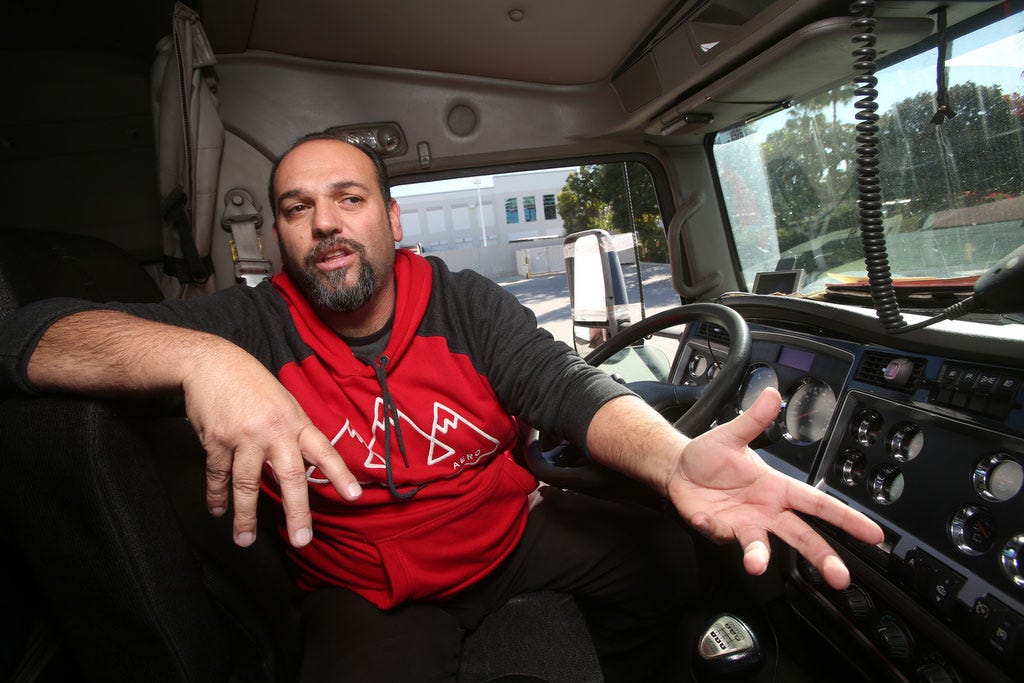
VAHE OLMASSAKIAN
From 2013 through 2016, trucks passed through the gates 23 million times, leaving a trail of which truck was on the road, when and where. The USA TODAY Network identified hundreds of thousands of instances where a truck was in operation for at least 14 hours without the required 10-hour break.
Not all of these instances are violations because two drivers might divide time behind the wheel of a single truck. But many companies ban that practice.
Pacific 9 is one of them. At least 7,500 times over three years, Pacific 9 trucks were on the clock for more than the 14 hour maximum, the port data shows. Almost all of the company’s 160 trucks exceeded the time limit at least once.
One Pacific 9 truck regularly operated through the night, more than 100 hours a week. Another went 35 hours without the proper break almost once a week for three years, according to the data.
When reporters shared the data with Ta, the executive said he couldn’t explain those circumstances and stopped responding to interview requests.
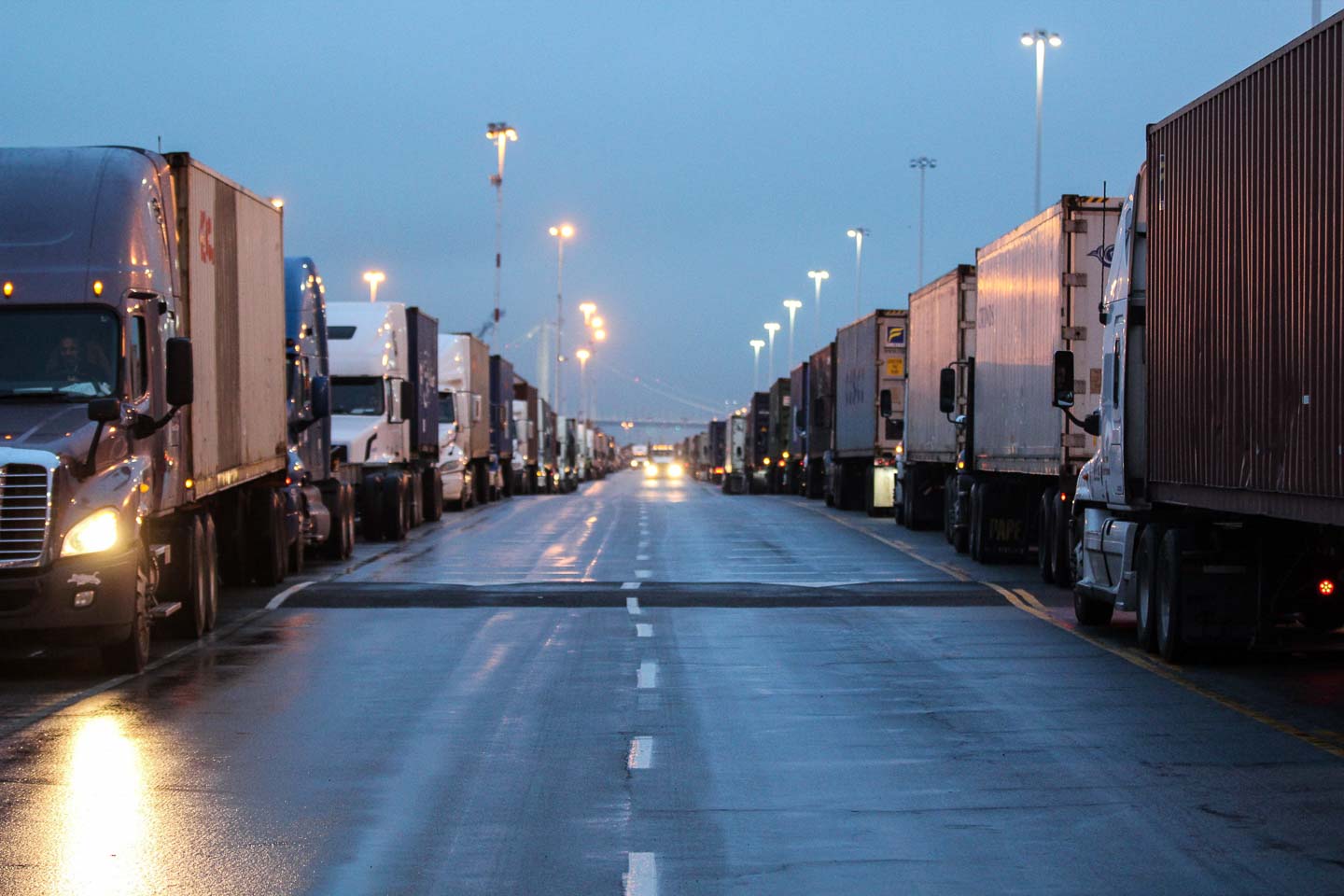
The role of retail
The scale of what comes through the ports of Los Angeles and Long Beach each year is hard to imagine.
If you laid the containers end to end, they would wrap around the Earth more than twice.
Most car parts manufactured across the Pacific come through Southern California. Same with electronics from China, Thailand or Indonesia. If you’ve bought anything from Walmart, Amazon, JCPenney, or any other store at the mall, there’s a good chance it started its trip across the U.S. with the port truckers around Los Angeles.
Using records from court hearings and labor cases and shipping log data provided by the trade research firm Panjiva, the USA TODAY Network identified the brands whose goods were moved by trucking companies with multiple violations. It’s not clear if the companies hired them directly. But retailers often don’t, relying instead on shipping and logistics companies to arrange trucking services from U.S. ports.
High profile customers
Through a maze of subcontractors, port trucking companies accused of labor violations have moved goods for some of America’s most beloved brands.
Hewlett-Packard, Costco and Hasbro have moved containers through Pacific 9. Fargo Trucking, with 45 violations, has moved Bissell vacuum cleaners, UPS packages and Nautica apparel.
Steve Madden shoes and Neiman Marcus have used Imperial CFS, which has lost seven labor cases to date.
None of those retailers would comment for this story.
JCPenney spokesperson Daphne Avila said in an email that the company “relies on its third-party transportation vendors to comply with all applicable laws and regulations.”
JCPenney, which once hailed the lease purchase program as “innovative and cost-effective" in a press release, has moved shipments through Pacer Cartage, part of a family of XPO Logistics companies accused by at least 140 drivers of labor violations in both civil court and the California labor commission.
John Taylor, a spokesman for LG Electronics, said the company hires steamship lines that provide “door-to-door” shipping services, so it is not involved in hiring or managing trucking companies. LG believes “our responsibility starts when the goods arrive in our own warehouses,” Taylor said in an email.
Driver contracts and shipping records show that Total Transportation Services and QTS, two of the most heavily cited companies in the harbor, have moved containers with LG goods.
Public pressure and new laws in recent years have forced retailers to monitor their international supply chains.
ADVERTISEMENT
Target, for instance, takes a strong stance against forced labor in the cotton factories of Uzbekistan. It says it sends auditors to screen the companies that turn cotton into t-shirts sold in its stores.
The retailer promises to drop any vendor found exploiting workers with debt, according to its corporate responsibility policy. It won’t use companies that punish workers “physically or mentally.” It orders a 60-hour maximum on work weeks, with fair wages and benefits.
But Target has ignored the labor commission rulings in California and continued to allow companies found to have violated workers’ rights to move its goods. Company spokesperson Erika Winkles declined to comment.
Jeffrey Klink, a former fraud prosecutor and corporate ethics professor at the University of Pittsburgh’s Graduate School of Business, said it’s easy for retailers to dodge accountability because they can argue they don’t directly hire port trucking companies.
“This is a classic case where the little guy gets screwed,” he said.
Put another way: “Nobody cares about us,” said trucker Gustavo Villa, “because we are living in the dark.”
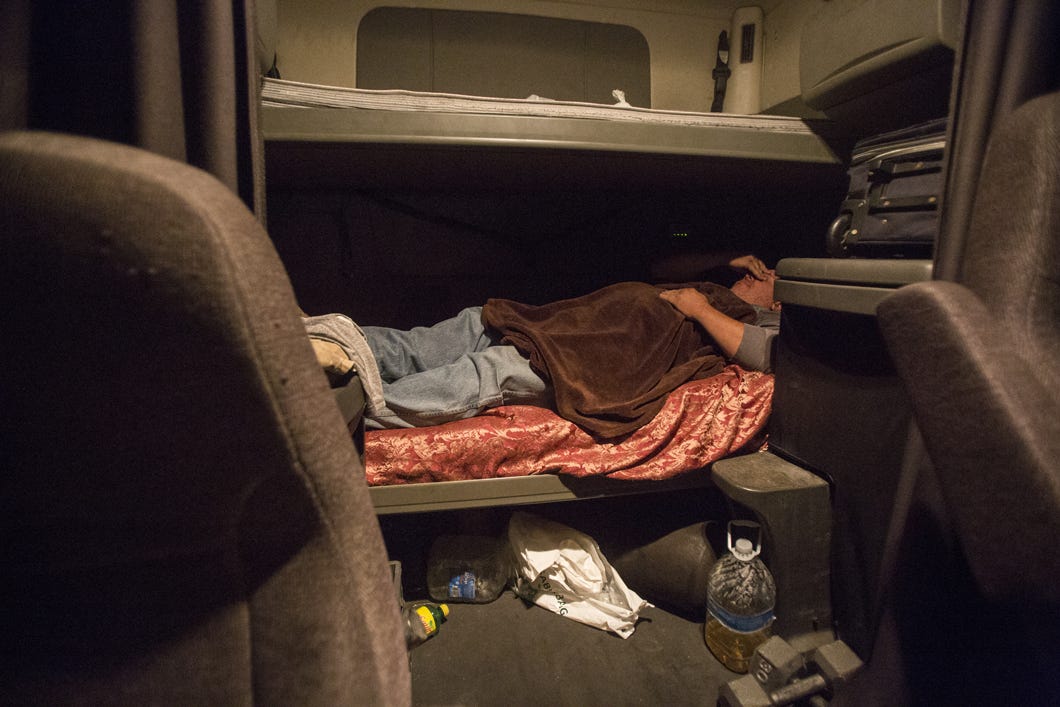
Samuel Talavera Jr. ends his 19-hour day at 1 a.m. by parking on the side of the road for a few hours of sleep. Talavera rarely sees his family because he works up to 20 hours a day, six days a week. He has taken home as little as 67 cents for the week.
DESIGN AND DEVELOPMENT BY: Angelo Cocci, Pim Linders, Mitchell Thorson, Shawn Sullivan, Ramon Padilla and Jim Sergent, USA TODAY.

